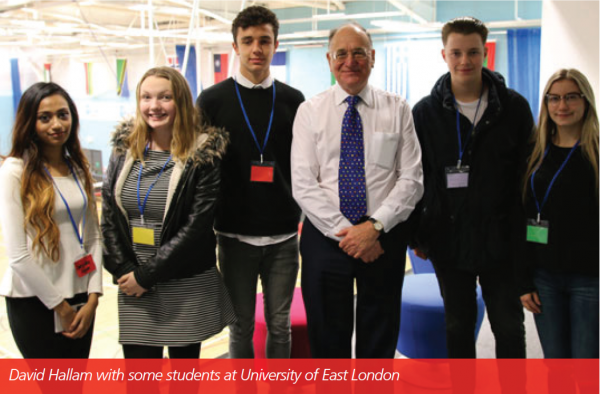
The University of East London invited David HALLAM to meet young students of the university for a conference called “Reconnecting East London Youth to Europe: Political and civic engagement“.
Mission report: RECONNECTING EAST LONDON YOUTH TO EUROPE
The University of East London is located in one of the poorest parts of London. However its Docklands Campus includes a wonderful sports hall and residential halls from the ‘Olympic Legacy’ of the 2012 games. I was particularly interested in contributing to the programme here because the University serves the area of London in which I was born and spent my childhood. I feel it was a plus that I was able to say to the young people that I come from a similar background and have gone on to represent my party both on a borough council and the European Parliament. On the fi rst day I met with leading members of the students’ union, the politics faculty and made a presentation to the third year international politics BA class.
My discussion with the students’ union ranged from housing to the diffi culties faced by mature students, outlining the issues they faced with a diverse student base, many of them, like me, fi rst generation undergraduates. My presentation to the International Politics undergraduates focussed on the size, structure, history and aspirations of the European Union. I then outlined the working life of an MEP and the particular issues that face the UK especially as we approach the referendum on continuing membership. There was a great deal of interest in the referendum and I got the feeling that most would prefer the UK to remain. After the lecture I spoke with several students who wanted to know about career opportunities within the EU structure.
The second day proved to be very challenging. The University invited four local schools to a special conference. These were fi fty young people who were preparing for the transition from secondary school to undergraduate courses. I briefl y repeated my presentation from the previous day. We divided them up into the EP’s eight political groups and then set them the task of creating an agreed motion on the refugee crisis. The majority of the young people were from ethnic minorities, had parents who were refugees or had been refugees themselves. The young people were very impressive in the approach they took to this task. For some it must have been diffi cult trying to understandand respond to political viewpoints with which they had no sympathy.
Eventually we achieved a consensus with some of the bargaining between groups interesting to watch. There were certainly several future MEPs in the room. I just hope that the UK remains long enough for them to take their seats. I spoke at length on a one to one basis with teachers and young people from each of the four schools. One school has established a ‘Feminist Club’ and they asked if I would be prepared to visit them and discuss my recent Master’s thesis on the fi rst UK women parliamentary candidates in 1918. Finally I think I should comment on the lecturers and teachers I met during the programme. Sadly, in the UK, the teaching profession has been seriously undermined by politicians, some regretfully even within my own party. It was fascinating to see how the staff worked with the young people both undergraduates and from the secondary school. Teaching is a precious skill and a profession that politicians should respect.

